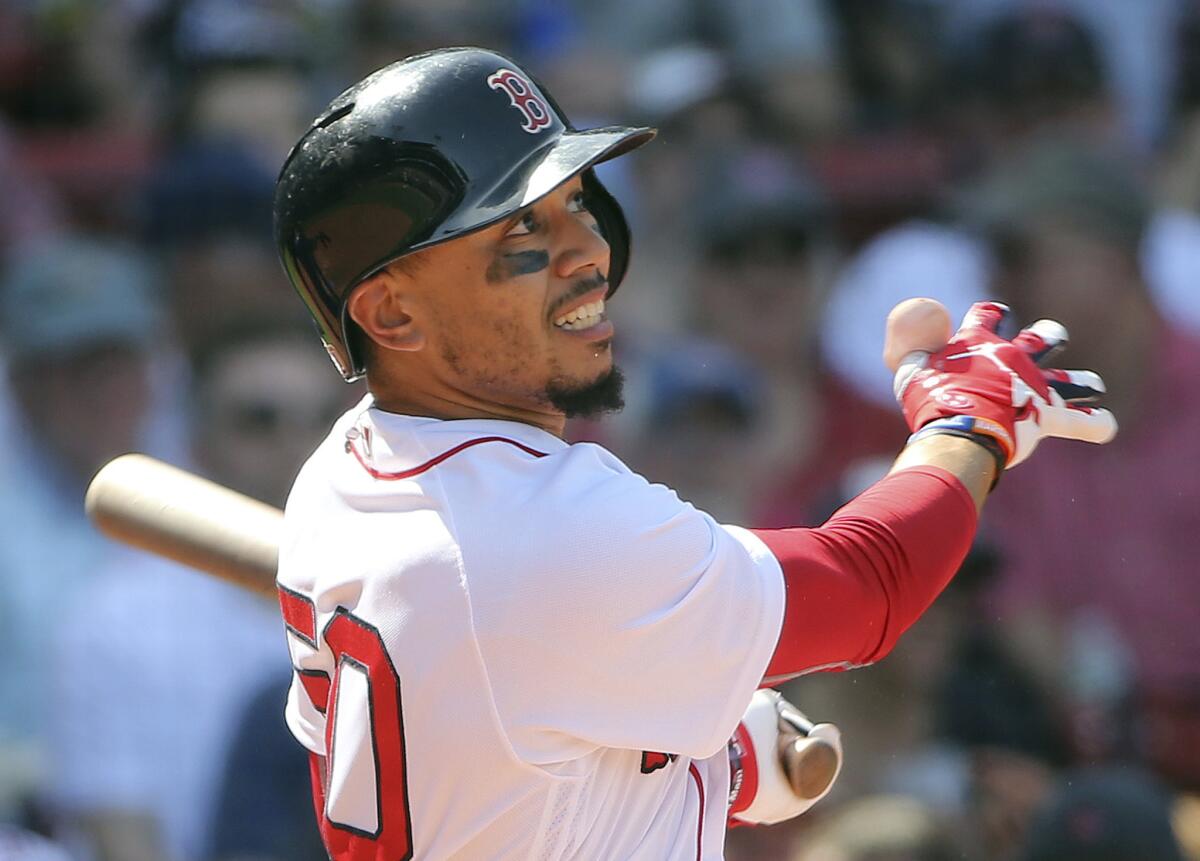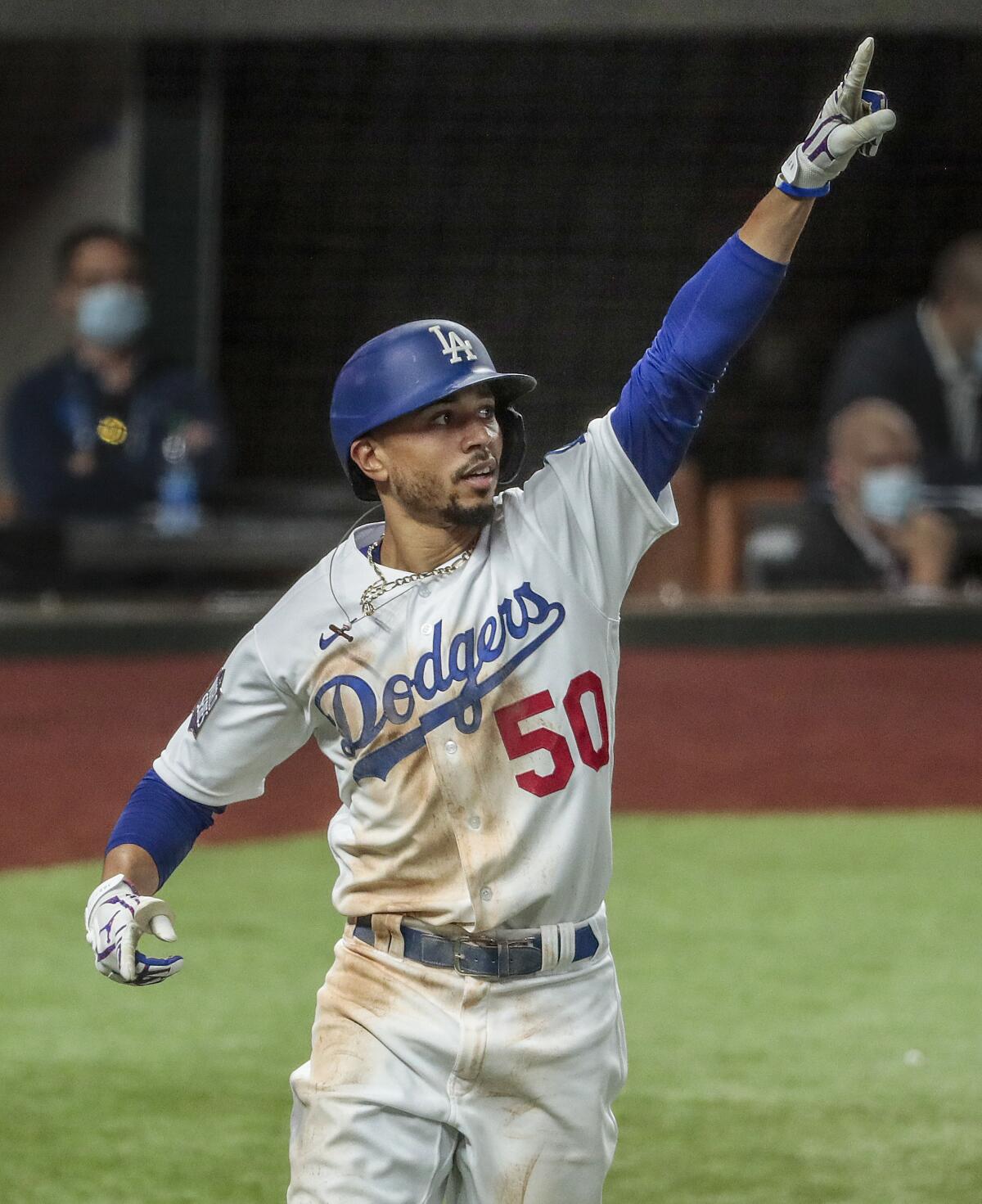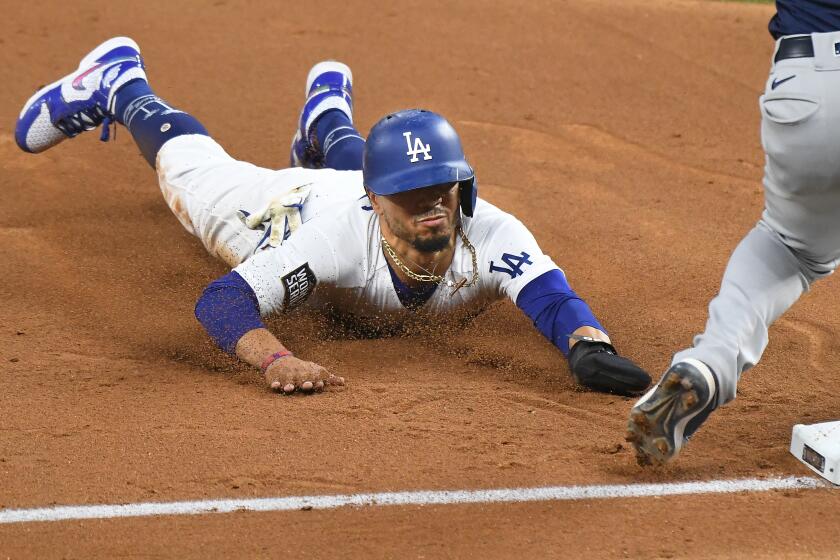‘The common denominator is stupidity’: Mookie Betts, the Babe and a Pissah-ed off city

For fans of the Boston Red Sox, this postseason, especially the World Series, is best watched through the cracks between the fingers covering their faces. Better to gaze directly at a solar eclipse with the naked eye than to watch the splendor of Mookie Betts on a nightly basis.
Mookie, you may have heard, once played for the Red Sox. Just like Babe Ruth once did before Sox owner Harry Frazee sold him to the New York Yankees, 100 years, one month and 15 days before Betts was traded in February to the Dodgers.
The Ruth sale haunted the Sox for the better part of a century. They went 86 years between winning World Series titles.
Rationally, of course, it is absurd to suggest that history is planning a similar fallout for the decision by Sox owners John W. Henry and Tom Werner — who have won four World Series since taking over the club in 2002 — to part ways with Betts. That decision was prompted by the team’s inability to persuade Betts to sign a long-term extension and a desire to create financial flexibility if they could not sign him.
But in a region in which the “Curse of the Bambino” became as accepted a part of the New England canon as Paul Revere’s ride, when has rationality been central to the discussion? Especially since, as Major League Baseball historian John Thorn noted, “payroll flexibility is hard to fly from a flagpole.”
Dodgers star Mookie Betts learned attention to detail and how to win from doting parents Willie Betts and Diana Collins.
“Are people comparing this to Babe Ruth? I wouldn’t go that far, though I did receive one e-mail to that effect this morning,’’ said Tony Massarotti, a co-host on New England’s top-rated sports talk show, “Felger and Mazz.” “For a minute there, I actually did have to think about it.
“Here’s the good news: If Mookie is the next Ruth, the Sox are a lock to win the championship in 2104!”
A week after the Sox traded Betts to the Dodgers, Leigh Montville, the legendary Boston sportswriter who wrote a book on the Babe (“The Big Bam”), bought a baseball cap. At first glance, it looked like a Red Sox cap, with the familiar “B” logo. But take a closer look: The cap had been recast in Dodgers colors. The red B, replaced with Dodgers white, surrounded by Dodgers blue. Montville bought the cap to remember Mookie. He’s been sporting it regularly.
The common denominator is stupidity. Never take joy out of the lineup.
— Jane Leavy, author of the Babe Ruth biography ‘The Big Fella’
“I still can’t believe the Mookie deal,” he said. “I don’t believe the great budgetary constraints that are used as an explanation. I don’t understand how he wasn’t signed a year, two years ago, before everybody reached the end of the line. Mookie is that transcendent player that comes along once in a generation. I wrote on Twitter when he left that to me he was the closest thing to Willie Mays I have ever seen, not only with his talent, but with the obvious joy he has for playing the game. If you can’t keep Mookie, then you should get out of the game because you don’t know what you’re doing.
“The Babe was the same situation. Transcendent player. Shipped out for financial considerations. I grew up in a home where we spit any time we heard Harry Frazee’s name, and I have to admit that I haven’t changed much. I know there is a contrarian view that has emerged in recent years, Harry was a good guy, made a smart move, yadda-yadda, but I’m not buying. Harry never loved Boston. Needed money, sold the Babe and the city down the river, run the credits.”

Jane Leavy, author of another acclaimed Ruth biography (“The Big Fella”), didn’t mince words when asked if she detected any parallels between the Babe and Betts deals.
“The common denominator,” she wrote in an e-mail, “is stupidity. Never take joy out of the lineup.”
Jared Carrabis, the popular Barstool Sports baseball columnist who makes no effort to conceal his love of the Sox, offered a vivid description this week about what it was like to watch Betts in a Dodgers uniform, making the kind of plays that marked him as a generational player while he was still with the Sox.
“We had a World Series game between the Rays and Dodgers, yet the entire Fox broadcast was about the Red Sox trading away a superstar in his prime,’’ Carrabis wrote. “It’s like getting a divorce from your wife, yet you’re forced to watch a livestream of her with her new husband for the next decade, seeing how happy she is with her new partner, thriving in ways that she never could when she was with you.
“It ain’t fun. But we’re just going to have to get used to it. We’re gonna be living with this trade for the rest of our lives.’’
Dodgers outfielder Mookie Betts reminded fans the fun of stolen bases in Game 1 of the World Series on Tuesday.
Enough already with the Babe, said Mike Barnicle, the MSNBC political commentator and former Boston Globe columnist who grew up in the heart of Massachusetts and has been a Sox season-ticket holder for decades. That was last century’s soap opera.
If you can’t keep Mookie, then you should get out of the game because you don’t know what you’re doing.
— Leigh Montville, author of the Babe Ruth biography ‘The Big Bam’
“Nothing to do with the Babe,” Barnicle said. “This is all about Mookie, money and judgment. It is rare in baseball or any sport that a team raises its own true generational player, an athlete of such skill and presence that the entire baseball world takes notice. And he just happened to be Black, playing each night in front of a full house of adoring fans in a city still scarred by racial tension born in the busing era nearly 50 years ago! And his name — Mookie — is a name young people, kids, gravitate to. So Mookie was destined to play his entire career in the Back Bay Basilica called Fenway Park but, but, but ... the baseball world and Red Sox Nation discovered the cruel truth, the harsh reality, that baseball is indeed a business.
“So Mookie was moved to the Dodgers in a cold, brutal accounting maneuver. And he is gone forever, too, destined to be in Cooperstown wearing a Dodgers cap. So far there has been no plan for a duckboat parade to celebrate the fact that the Red Sox succeeded in their quest to get below the payroll tax penalty. And believe me the majority of real fans will never get over it. Not just because he was our own homegrown superstar, but because he was also someone everyone of any age could and did admire.’’
And that, it would seem, will be the fate of the Red Sox fan for the next decade or more, watching Betts thrive in a city that has, as the Celtics-Lakers rivalry so vividly displayed (“Beat L.A.”), typically engendered a) contempt b) resentment c) jealousy or d) all of the above.
Call it the Malediction of Mookie.
Gordon Edes is a former Times reporter who covered the Boston Red Sox for 18 years for the Boston Globe and ESPN.com.
More to Read
Go beyond the scoreboard
Get the latest on L.A.'s teams in the daily Sports Report newsletter.
You may occasionally receive promotional content from the Los Angeles Times.











